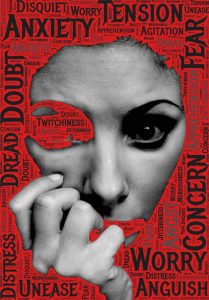
In this page, I want you explore the feeling of being stressed in more depth. This is the prime way you recognise you are stressed. It is not about the cause of your stress nor about how you manage stress. This sounds as if it might be obvious but the point is that you need to recognise when you start to become stressed – NOT when your stress is full blown and both you and everybody else is aware you are stressed!
If you can recognise stress when it starts, you then have a chance to do something about it before it becomes a huge problem. We are all different so will feel stress differently; nevertheless, there are a finite number of symptoms you can experience when you are stressed. For example:
When Mark was stressed he would go quiet and withdraw into himself. He lost his sense of humour and his appetite and became inattentive so he did not respond when his wife spoke to him. It was often only when she said, ‘What’s the matter with you?’ that they both realised there was something troubling him. His mate, Dennis, was different. When he was stressed everyone knew about it! He became irritable and agitated and talked a lot, complaining about how terrible life was. Mark would respond by teasing Dennis, winding him up so he became madder. He would then fall apart laughing at him. They thought their behaviour was all part of their nature and friendship. They never really connected what was happening to the onset of stress.
You may already understand about this and have worked out for yourself how you react to stress. In that case you may wish to skip the rest of this page and go to the next one that focuses on ways to manage these symptoms of stress and especially the symptoms that you commonly experience.
I suspect, however, that it is more likely you have not given this much attention. That is quite understandable as the stress itself will be more important to you than examining the ways you respond to stress. And it is! That is one reason for leaving this topic until now.
Now you have reached the Delving Deeper stage you should be able to cope with an introspective analysis of yourself! That is the second reason for leaving this topic until now. Hopefully, you now have a measure of control about your stresses and know how to approach them, so you can afford to reflect about what goes on inside you when you are facing stress. For you are now required to think about yourself, the emotions and behaviour you express when you are stressed. It is possible to get overabsorbed about yourself and how you feel and react; and equally it is possible to shun such considerations. That may be from embarrassment, or for fear of what you may discover about yourself!
Ready to go? Be brave!
I will go through a long list and you will need to identify the symptoms that you experience. Use the link to the relevant form and tick the box that applies to you. Tick the first box if you experience this particular symptom frequently when you are stressed, the second box if you experience it on some occasions of stress, the third box if you experience it only occasionally and the fourth box if it never or hardly ever affects you.
Let me now describe these symptoms so you can better work out what each word or phrase means. First we will think about emotional symptoms.
Emotional
 This first section lists a range of emotional symptoms that are different expressions of three core emotions – anxiety, anger and depression.
This first section lists a range of emotional symptoms that are different expressions of three core emotions – anxiety, anger and depression.
Anxiety. The first five are about degrees of anxiety or worry. For you, it may be just a vague uneasiness that is hard to pin down.
Or it may be something that concerns you so you think about it a lot but without becoming distressed.
Anxiety or worry is when you brood over something. You may try to put it out of your mind but it keeps popping back and you think about it frequently.
It may be worse. If the thoughts go round and round in circles and interfere with other thoughts and the activities of life so you are preoccupied with them and fearful, this is apprehension.
It may progress even further to dominate your thinking. It is with you when you awake, throughout the day and even disturbs your sleep. You imagine the worst possible outcome –- even though in your heart of hearts you know that whatever it is you are worrying about may not happen. This is dread.
Does this description relate to your experience? Click on the response button below and complete the form ticking the relevant boxes. Tick as many as are relevant to you. For example, you may feel uneasy all the time, worried sometimes and dread only occasionally.
Anger. The next group relates to anger.
This could be a mild irritation that may be evident only to you but may be expressed verbally or in your body language.
If more significant you will feel anger deep within your being and will probably show it verbally or by your behaviour.
A more extreme form is shown by aggressiveness that can be expressed verbally with threats or even physical acts of violence.
Do be honest when you answer these questions even though it may be embarrassing or even shameful to recollect the less pleasant aspects of your personality and behaviour. Remember, this is for your own eyes only unless you choose to share it with anyone else.
Depression. The next group of symptoms relate to depression.
 You may be moody with sudden and unexpected bouts of unhappiness and grumpiness.
You may be moody with sudden and unexpected bouts of unhappiness and grumpiness.
There may be a sense of self-dissatisfaction and you may notice you have loss of hope so you do not expect anything to turn out well.
If more significant, this may affect you so you feel worthless.
Feeling down and despondent so it is hard to be positive and even appreciate humour are features of despair.
This may include suicidal thoughts when feeling particularly down but an improvement in circumstances or even a good night’s sleep can improve the feeling significantly.
Please note that the feeling of depression is not necessarily related to the illness that is also called depression. Sometimes it is difficult to distinguish the feeling of depression that is a reaction to circumstances from the illness of depression. If in doubt, consult your general practitioner.
A story may help you appreciate how difficult it can be to distinguish between the feeling of depression due to stress and the illness that is also called depression.
Amanda went to see her GP as she was depressed, could not cope at work and could not understand why she felt the way she did. Her doctor listened to her story and asked lots of questions and had her fill in a questionnaire about her symptoms. He diagnosed depression, gave her some tablets and booked a follow up appointment for two weeks. Three months later she saw the same doctor for an unrelated problem. He treated that and as she was preparing to leave he stopped her, ‘Last time I saw you,’ he said, ‘you were ever so depressed. I asked you to return in two weeks I was so concerned about you – but now you do not appear to be depressed at all. What happened?’ Amanda explained that as she went home after the consultation she started to feel better. She went to bed and slept like a log and was normal the next day. She had been unhappy at work so she gave in her notice and had started a new job she had been offered. Life was good! And no, she never took the prescription. She was happy but embarrassed as she told her story as she still did not understand. Her doctor did and explained what had happened. She had been stressed because of work issues and was in two minds whether or not to move to the new job she had been offered. That had caused symptoms such as tension headaches, irritability and insomnia that had built up until she collapsed in weepiness and depression. Talking to her doctor had helped her get all that was going on in her life in perspective so she intuitively knew how to deal with it. Her depression lifted. She acted on her decision and recovered. ‘Funnily,’ she commented to her doctor, ‘I never connected my work issues with how I was feeling.’ Her doctor nodded wisely, and with some relief, ‘We humans are complicated,’ he said, ‘we can disconnect aspects of life from other aspects and compartmentalise them. It is a way we cope with stress. It can make us depressed and even suicidal.’ They laughed together as they parted, ‘That is one diagnosis I am glad I got wrong,’ he said.
Physical
Stress can affect you physically. Some symptoms relate to the cardiovascular system so you may be aware your heart beats faster (palpitations), you may be aware that you sweat (perspire) more than usual and may feel faint.
Stress may affect your muscles so you experience muscle tension. One aspect of this is tension headaches due to tension in the neck muscles. You may notice trembling of your hands, face or legs and possible twitchiness so your leg, for example, will suddenly jump. You may be restless, expressed in finger tapping, head scratching or the inability to sit still.
Some people experience abdominal symptoms such as feeling hungry and a tendency to eat too fast. They may have nausea, ‘butterflies,’ wind (up or down) or diarrhoea. If you already have an intestinal disorder such as hiatus hernia, irritable bowel syndrome or colitis you may notice a worsening or recurrence of symptoms.
Worsening or recurrence of symptoms relates to many other illnesses apart from intestinal disorders. Use the same box if you are aware of any other condition that becomes worse when you are stressed. This can apply to almost any illness but it is certainly common in such conditions as asthma, angina and eczema.
Be especially careful when assessing physical symptoms as they may be due to a physical illness. Bear in mind that stress and a physical illness may occur at the same time. Do not trust your own assessment of worrisome symptoms. Consult your doctor. Tell him about your symptoms and any stress you have. Let the doctor guide you about further investigations or treatment. And do not be embarrassed if the doctor reassures you that no serious illness can be found. The doctor will share your relief!
Behavioural

 Changed behaviour in various ways may be the effect of stress. This may include weeping, biting nails, talking excessively, hesitant speech (umming and erring), difficulty sleeping, vivid dreams or having nightmares. Some may feel tired all the time while others are aware they sleep excessively. Some may have to pass urine frequently. Smokers may find they smoke more and some are aware their alcohol intake increases. Finally, freezing is a condition when everything seems to stop. Physically you may be unable to move, or your mind stops so you cannot think or know what to say. This may last only a few seconds or it can persist for many hours. If severe you may end up in hospital for fear you have had a stroke or some sort of brain seizure. That sounds frightening, doesn’t it? Not surprisingly, doctors get frightened too and may need to undertake all sorts of tests and even arrange hospital admission before they can be sure it is not a serious illness.
Changed behaviour in various ways may be the effect of stress. This may include weeping, biting nails, talking excessively, hesitant speech (umming and erring), difficulty sleeping, vivid dreams or having nightmares. Some may feel tired all the time while others are aware they sleep excessively. Some may have to pass urine frequently. Smokers may find they smoke more and some are aware their alcohol intake increases. Finally, freezing is a condition when everything seems to stop. Physically you may be unable to move, or your mind stops so you cannot think or know what to say. This may last only a few seconds or it can persist for many hours. If severe you may end up in hospital for fear you have had a stroke or some sort of brain seizure. That sounds frightening, doesn’t it? Not surprisingly, doctors get frightened too and may need to undertake all sorts of tests and even arrange hospital admission before they can be sure it is not a serious illness.
Tom froze once – fortunately it was mild and brief. He was at a training meeting at church one evening and while supping coffee in between sessions the leader asked him to give out some papers. He took them but just stood there. He could not physically move. No one seemed to notice, except for the leader. It seemed to last for ages but it must have been only a minute or two before the leader took the papers and gave them out himself. Then Tom could sit down. He felt stunned. It was so unexpected. He was not stressed at the time, well, he did not feel stressed. The meeting was gentle and was going well. But he was under a lot of pressure at work and stress was such a normal part of his life he was chronically tired. He took this experience as a signal to take life easier and to build in some relaxation time. It must have worked as it never happened again.
Intellectual
Thinking processes may be affected by stress so you may be aware you have poor concentration, are forgetful and have become more self-critical and indecisive.
You may realise you keep going over in your mind or even talking about your worries, fears and troubles. This is rumination and is a feature of an overactive mind.
In particular, you may become pessimistic and think the worst of everything.
However, you may, in contrast start preparing coping strategies so you can cope with your stress.
Spiritual
Stress may cause you to start to pray, even if it is only, ‘God, help me,’ while those who are in the habit of praying find it difficult to pray or if they do, their prayers are centred on themselves.
You may find it difficult to keep up your usual spiritual practices such as Bible reading or attending church.
If you are a believer, you may begin to doubt God’s goodness and compassion or even his existence. This can be hard to talk about or even admit but it is a normal part of being stressed – it does not mean you are losing your faith or have irrevocably let God down.
You may notice a loss of your usual sense of peace, joy and no longer have a desire to serve others.
Some begin to feel sinful, believing, or just wondering, if they have broken one of God’s rules for life – whether or not they can remember what that infraction was.
That can lead to a sense of guilt and an expectation of punishment. Some begin to wonder if their present stress is such a punishment.

Obviously, no one is affected by all these symptoms but they are listed like this because they all affect some people some of the time. Symptoms often follow a pattern, however, so with experience you will recognise (or those close to you will) when you are becoming stressed. You may also become aware that your pattern of symptoms may vary depending on the type of stress you undergo. Such understandings will not happen over night – in fact, it will certainly take months, and possibly many years before some insights occur.
You will need to make changes to your answers during the next few weeks and months as you learn about stress and how it affects you for you will not identify your full pattern of stress symptoms the first-time round. As you reflect on your stresses you will discover new insights about yourself.
Now for the difficult bit!
How about getting a friend to go over this with you?
This is scary!
There is no hurry about doing this. You may prefer to wait until you have worked through more of this website or even further into the future after you have already learned something about your strengths and weaknesses, have made some changes and wish to go further.
Choose a friend carefully. It needs to be someone who knows you well, someone whom you trust, who will be kind and will not break a confidence. When they have done their assessment go over it with them. Discuss their opinions and compare them with your own. You may argue and get upset so warn them of this and be ready to make up, say sorry and accept that you appear differently to others than the way you feel about yourself on the inside. I expect you will find that they have insights into your behaviour that you have not noticed. I expect you will learn even more about yourself.
One way of easing the suffering from stress is to do something about these individual symptoms. This is not doing anything about the reason you are stressed but just dealing with the way you feel – and it works!
